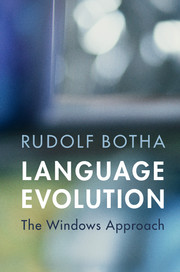Part IV - Abduction windows
Published online by Cambridge University Press: 05 March 2016
Summary
Recall that the windows on language evolution examined in Part II of this book are instances of correlate windows, whereas those analysed in Part III represent analogue windows. In Part IV I discuss two windows – the music window in Chapter 10 and the animal window in Chapter 11 – that exemplify a third, logically distinct, kind of windows: abduction windows. That is, the inferential steps provided for by these windows are instances of abductive reasoning, which resemble analogical reasoning in representing a form of ampliative reasoning. In the case of the music window, the inferential steps are grounded in data about commonalities between modern music and modern language; in the case of the animal window, the inferential steps depart from data about comparative animal behaviour.
But what does abduction or abductive reasoning involve? The term ‘abduction’ was adopted by the pragmatist philosopher Charles Sanders Peirce to denote a kind of reasoning (inference or argument) that is distinct from induction and deduction in his view. Evolved through Peirce's long scholarly career of more than fifty years, his theory of abduction is considered to be complex and less than clear in a number of ways (Douven 2011; Fann 1970; Paavola 2005; Plutynski 2011; Psillos 2011; Schurz 2008). It is therefore not surprising that scholars have come up with conflicting interpretations of various aspects of this theory. As remarked by Anya Plutynski:
Debates concerning the character, scope, and warrant of abductive inference have been active since Peirce first proposed that there was a third form of inference, distinct from induction and deduction. (Plutynski 2011: 227)
The complexities of Peirce's views on abduction lie outside the scope of this book: these complexities play no role in my analysis of inferences drawn with the aid of the music and animal windows. However, some of the views embodied in Peirce's later theory of abduction (1891–1914) form a useful background for my analysis; I present these views in outline below, drawing on accounts by Douven (2011), Fann (1970) and Schurz (2008). (References to the various volumes of Collected Papers of Charles Sanders Peirce are given in the conventional numerical format: the number of a volume, full stop, the number of the paragraph in the volume. For instance, ‘5.172’ means ‘volume 5, paragraph 172 of the Collected Papers.)
- Type
- Chapter
- Information
- Language EvolutionThe Windows Approach, pp. 195 - 198Publisher: Cambridge University PressPrint publication year: 2016

